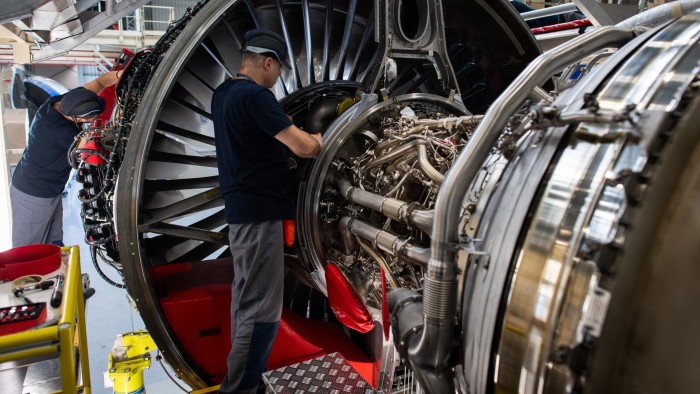Unlock the Editor’s Digest for free
Roula Khalaf, Editor of the FT, selects her favourite stories in this weekly newsletter.
French jet engine maker Safran said China had granted tariff exemptions for imports of some aerospace parts, even as it warned that the constantly shifting tariff landscape made it difficult to measure the impact on its business.
Chief executive Olivier Andriès said China had exempted “any deliveries of engines, nacelles [engine casings], landing gears or parts” from import taxes, adding that it was a sign of the fluidity of the situation.
Safran was taking measures to mitigate tariffs, he said, but would “not be shy” about passing on some of the extra costs to customers. “This tariff situation is creating inflation, so we’re going to impose a surcharge to our customers,” he told reporters and analysts on Friday.
Shares in the company rose almost 5 per cent on Friday morning after it posted better than expected results despite the tariff threat and as signs emerged that China and the US were weighing exemptions on some imports.
The decision by China to exempt some parts is a sign of a possible easing of tension between the two countries.
The aerospace industry relies on integrated global supply chains and is particularly exposed to the trade war launched by US President Donald Trump. Boeing this week said China had stopped taking deliveries of its jets as buyers balked at the higher costs from the country’s retaliatory tariffs of 125 per cent on US imports.
Safran is part of the CFM International joint venture with GE Aerospace that supplies engines for the C919 aircraft built by China’s Comac. Analysts have warned that the state-backed manufacturer could have problems securing critical parts because of the trade war.
Companies are working to mitigate the impact of tariffs on the industry.
Safran has a manufacturing base in Mexico that supplies the US market. Andriès said the company was working to ensure parts in Mexico were covered under the trade deal between the US, Mexico and Canada and excluded from tariffs, including by providing additional certification of origin.
Safran is also using bonded warehouses, storage facilities near ports and airports that do not require companies to immediately pay import duties.
Safran has maintained its guidance for 2025 but without including the impact of tariffs. Other companies in the sector, including GE, RTX and Boeing, have factored in estimates of the extra costs, noted Nick Cunningham, an analyst at Agency Partners.
“The exemptions are changing every week, sometimes every day. That’s why we’re reluctant to communicate on the quantification of the impact,” Andriès said.
Safran reported a 16.7 per cent rise in revenues to €7.3bn in the first three months of 2025, above analysts’ estimates.
Sales were driven by its propulsion division, which includes its Leap engines used by Boeing and Airbus.

